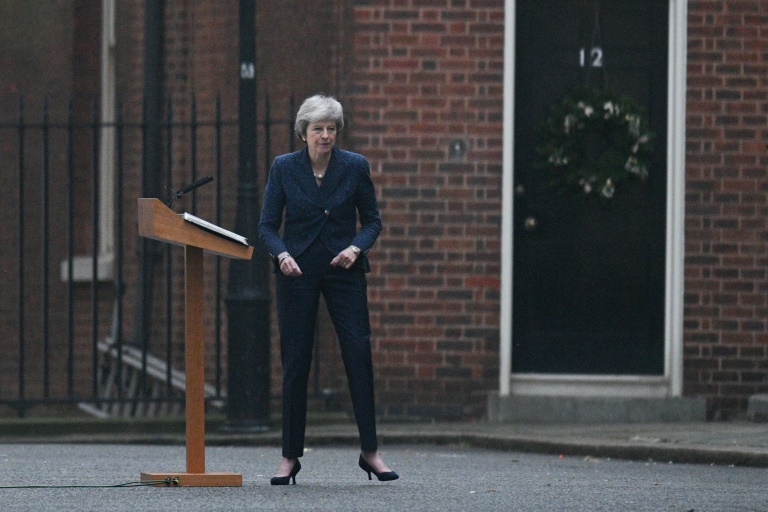
British Prime Minister Theresa May was hit by a no-confidence motion from her own party on Wednesday over the unpopular Brexit deal she struck with EU leaders last month.
The move plunged her deeper into her biggest crisis since she took office after Britons voted in June 2016 to leave the European Union.
May vowed to fight the challenge inside her own Conservative Party “with everything I’ve got”.
“Weeks spent tearing ourselves apart will only create more divisions,” May said in a statement delivered outside her Downing Street office.
“I stand ready to finish the job.”
A party confidence vote in her leadership is scheduled for Wednesday evening after dozens of Conservative MPs submitted letters calling for one.
That followed her decision to delay a vote on Brexit that she admitted she was certain to lose.
If May is defeated in Wednesday’s party ballot, a leadership election will be held over the coming weeks.
If a new party chief is elected, he or she automatically becomes Britain’s new prime minister.
The fate of both May’s unpopular draft withdrawal agreement and her government are now in the balance with the clocking ticking down to Britain’s March 29 departure from the European Union after 46 years.
May cancelled a cabinet meeting scheduled for Wednesday that had been due to focus on preparations in case Britain leaves the world’s largest single market without any official deal on future trade arrangements.
The pound fell on the first rumors of an imminent leadership challenge on Tuesday evening. It regained the losses once the news became official and May went on national TV to announce she would fight for her job.
Cabinet support
The confidence vote was triggered after months of plotting by Brexit-supporting Conservative MPs to collect the minimum 48 letters from MPs necessary to trigger a vote.
The last batch of letters came in after the prime minister, facing a heavy defeat, delayed a parliamentary vote scheduled for Tuesday on her draft withdrawal agreement with Brussels, sparking fury among MPs across party lines.
If May survives Wednesday’s motion, no second one can be brought by her party for another year.
A clutch of top members of her cabinet quickly rallied to her support.
“The last thing our country needs right now is a Conservative Party leadership election,” Home Secretary Sajid Javid tweeted.
Javid himself has been mentioned as a possible replacement for May.
Foreign Secretary Jeremy Hunt, who has also disagreed with May over her Brexit strategy, wrote on Twitter: “I am backing @theresa_may tonight.”
But MP Jacob Rees-Mogg, one of Britain’s most prominent opponents of the EU, said it was “time for Mrs May to resign”.
Seeking concessions
The British leader toured European capitals on Tuesday in an attempt to salvage her Brexit arrangements, after MPs savaged its provisions on the issue of the Irish border.
May said she wanted “assurances” from EU leaders that if Britain ever entered the so-called “backstop” customs arrangement for the border, this would only be “temporary”.
She received sympathy from EU partners but firm rejections of any attempt to reopen the agreement, which was approved by EU leaders last month after nearly two years of tortuous talks.
German Chancellor Angela Merkel said after meeting May that there was “no way to change” the deal.
May cancelled a trip to Dublin on Wednesday for talks with Irish Prime Minister Leo Varadkar, but is expected to attend an EU summit in Brussels on Thursday.
“I doubt if she really knows what she’s going to achieve,” said Pippa Catterall, professor of history and policy at the University of Westminster.
Down to the wire
May said the parliamentary vote on Brexit will be held by January 21, giving her time to show Britons that she is trying to wrest every possible concession from EU leaders.
Catterall said that May could be trying “to take it down to the wire… so in the end parliament is faced with the choice: my deal or no deal”.
Even if May survives Wednesday’s vote and potential leadership challenge, she could face a further no-confidence motion from opposition parties.
The main opposition Labor Party has said the government is in “disarray” but is so far holding off from attempting to topple May.
The Scottish National Party and the Liberal Democrats, which are both anti-Brexit, have urged Labor to do so and are hoping this could lead to a second referendum.
A lot will hinge on what the Democratic Unionist Party, whose 10 MPs prop up the government, will do.
DUP leader Arlene Foster said on Wednesday she was not “surprised” by the no-confidence motion, adding that her focus was on “the fact that the backstop needs to be taken out of that withdrawal agreement.”




